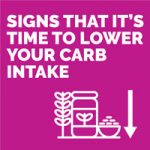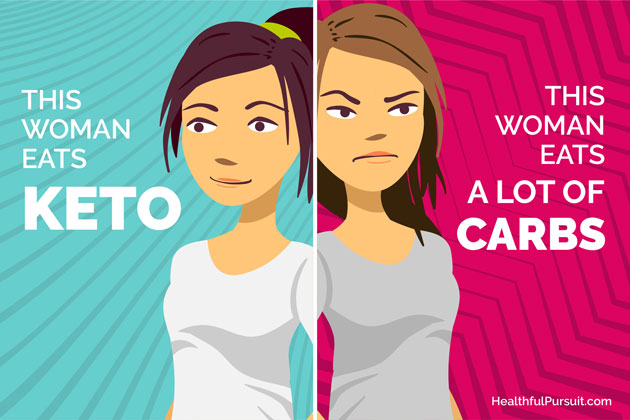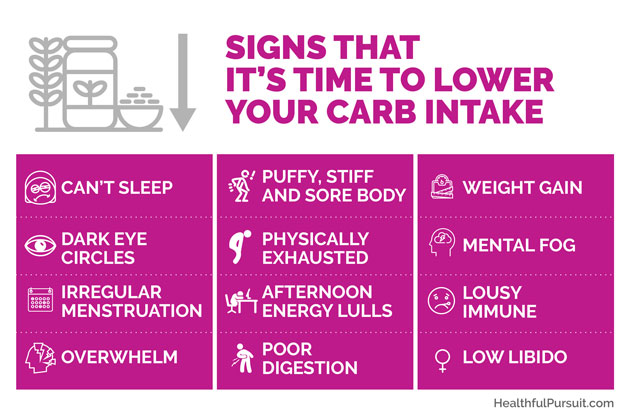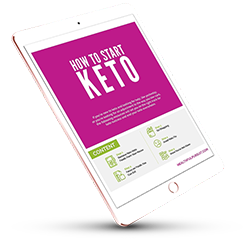I want...
Why Eating Keto Makes You Less Stressed
June 16, 2018 By
Leanne Vogel

 October 12, 2018
October 12, 2018

Eating sugar (and carbohydrates) chronically stresses us out. Let’s dive into how it happens and what you can do about it to STOP cravings in their tracks on your ketogenic diet.
We associate stress with our hectic schedules and endless to do lists, but a large portion of the stress we experience is from the foods that we eat.
Keto shopping lists, recipes, and more! Start keto with this FREE 5-step guide.
I'm ready!Before we delve deep into how stress gets worse depending on what foods we eat, I think it’s worthwhile explaining what keto is so for those of you thinking, “what is keto?” aren’t totally lost with the conversation that follows.
The ketogenic diet, or keto, or nutritional ketosis, or fat burning, is all the same thing. With keto, we are using fat to fuel us instead of carbohydrates. In a carbohydrate-fueled state one needs to eat frequently to keep energy up. With keto, when we are fat fueled, we can go hours without food because we are using the energy (aka fat) on our bodies to fuel us.
First, the basics: your adrenals sit on top of your kidneys. They’re no bigger than a walnut, no heavier than a grape. These little guys are responsible for releasing hormones like cortisol and adrenaline, effectively managing how your body deals with stress and, the kicker? Helping you maintain balanced blood sugar.
What happens when you run those kids to soccer, go to the gym, compete for the promotion, worry about your diet, or count your calories to exhaustion?
Cortisol increases.
In fact, I did this video awhile back on the problem stress causes to hormones which is totally worth a watch if you’re struggling with this very thing!
Cortisol, the primary stress hormone, increases sugars (glucose) in the bloodstream – so that you have the fuel you need to run away from the “danger” that your body believes it’s being subjected to when you’re stressed. When you’re in this “fight or flight” mode, resting, digesting and healing is your bodies last priority.
And, when you come down off that high, your body will naturally crave sugar.
The more dysfunctional these hormones are, the more damaged your metabolism. You aren’t processing foods properly, you aren’t healing, you aren’t managing blood sugar – it becomes a real mess.
(TIP) If you’re on a ketogenic diet, high cortisol will make it impossible to generate high ketones.
Avoid Sugar and You’re Set… (nope!)
Removing white sugar is a great first step. It’s highly addictive. But (something you may not be aware of) all carbohydrates are sugar. Years ago, it was believed that the type of carbohydrate (simple vs. complex) played a role in blood sugar regulation. However, the body converts digestible carbohydrate (non-fibrous components) into glucose, regardless of the source.
The major takeaway here is that ALL dietary forms of carbohydrates are broken down into sugar (glucose), whether it’s a fruit-filled smoothie, glorious kale salad, or a sugar cookie.
Ready to ditch the cravings? Start with my 30-day introductory guide to keto, The Keto Beginning. This is the same program that I used to lose 20 pounds, 12% body fat, get off my ADHD medications, stop snacking, and stop craving sugar!
Get the 30-day guide with meal plan here.
How Do Carbs Increase Your Overall Life Stress?
High blood sugar causes cellular stress, calling on the adrenals to level the playing field. And this is the problem – we eat breakfast, our blood sugar rises, stress-rate rises, cortisol is released, insulin is released to move glucose to our cells, fight or flight kicks in, digestive processes stop, blood sugar lowers, cortisol remains high, you become hungry, you eat… process begins all over again. Only this time, cortisol levels are heightened, your body isn’t digesting food properly, and you’re likely lethargic, cranky, a bit on edge.
This constant rise (and fall) in blood sugar at most every meal and snack for years and years is very hard on the body. The more work you give the adrenals by over eating sugars and starches, the more stress you put on your adrenal glands every single day, no matter how many breathing techniques, yoga classes or meditations you inject into your life.
The more dysfunctional these hormones are, the more damaged your metabolism. You aren’t processing foods properly, you aren’t healing, you aren’t managing blood sugar – it becomes a real mess. And this, in the end, leads to glucose intolerance and insulin resistance – your body can no longer deal with the demand.

Signs That Carbs Are Stressing You Out
Here are some signs that it’s time for an adjustment to your carbohydrate intake:
- Can’t Sleep
- Dark Eye Circles
- Irregular Menstruation
- Overwhelm
- Puffy, Stiff and Sore Body
- Physically Exhausted
- Afternoon Energy Lulls
- Poor Digestion
- Weight Gain
- Mental Fog
- Lousy Immune
- Low Libido
How Do You Reverse This Vicious Cycle?
For many, a whole food-based eating style that’s lower in carbohydrates and stimulants is essential to allow the adrenal glands time to rest and recover.
This doesn’t mean eliminating all carbohydrate sources. It just means less, far less, than what we’re eating. A “clean” whole foods lifestyle can range anywhere between 50-60% of our total intake from carbohydrates. If you are in the business of following a stress-free eating style, 20% of total intake from carbohydrates is a great first-step.
Don’t worry, you’re not alone with your cravings. With a couple of small adjustments, you can kick those cravings to the curb and start to feel good! Need a little bit of inspiration? Remember that we all deal with cravings. Here’s a little video I made a couple of years ago when I was at the end of my rope dealing with my cravings.
Resources: here, here, here, and here.
This entry was tagged: eating keto, how eat keto, keto, keto basics, ketogenic diet
Hi! I'm Leanne (RHN FBCS)
a Functional Medicine Practitioner, host of the Healthful Pursuit Podcast, and best-selling author of The Keto Diet & Keto for Women. I want to live in a world where every woman has access to knowledge to better her health.






